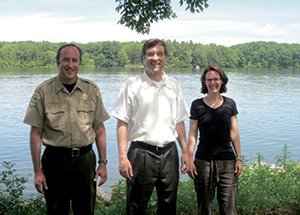Pymatuning Widens Its Learning Terrain
A variety of students benefit from the learning environment at an unusual educational setting—Pitt’s Pymatuning Laboratory of Ecology in Northwestern Pennsylvania. Here, it’s not unusual to find students majoring in biology or environmental studies or those conducting research on wildlife diseases and ecotoxicology. But the site also draws students from other disciplines, such as a communication student working on signage for a bird nesting area or an engineering major mapping out a new trail.
 For generations of Pitt students interested in ecology and the natural world, the Pymatuning Laboratory of Ecology has been an invaluable resource, supporting a wide range of field classes since its establishment in 1926.
For generations of Pitt students interested in ecology and the natural world, the Pymatuning Laboratory of Ecology has been an invaluable resource, supporting a wide range of field classes since its establishment in 1926.
Now, a new Learning Lake Initiative has been launched, and it envisions the 17,088-acre Pymatuning Reservoir as “a dynamic intellectual ecosystem of interdisciplinary learning and research,” open to students in disciplines across the University. The ambitious initiative is a partnership among Pitt, Pymatuning State Park, and the surrounding community.
The effort, a University Honors College initiative, encourages undergraduate students in all disciplines to undertake research projects in fields ranging from architecture to public health. It is codirected by Gordon R. Mitchell, associate professor of communication and clinical and translational science and assistant dean of the University Honors College, and Kathleen McTigue, associate professor of medicine and epidemiology and director of the Clinical Scientist Track, School of Medicine’s Internal Medicine Residency Program.
“If an undergraduate student in biology is interested in research, they can walk into a lab, meet a principal investigator, and there are usually graduate students and postdoctoral fellows who can help with mentoring,” said Mitchell. “But in the humanities and social sciences, that doesn’t tend to be the case. It’s why students in those areas find it harder to break into research.”
The initiative seeks to remedy that situation by offering several hands-on opportunities for original research, ranging from designing effective signage to alert visitors that they are entering a bald-eagle nesting area to negotiating legal questions surrounding the construction of a 2.5-mile trail through the park.
“Engineering students were able to tackle this in a very concrete way,” said McTigue of the trail project, citing the work of undergraduate students in a Computer Assisted Design course taught by Dave Sanchez, research assistant professor of civil and environmental engineering. After devising a physical model of the lake, the students designed bridge trusses that could link a key portion of the trail that passes over a creek.
The initiative’s creative and inclusive approach to using Pymatuning Lake as a learning resource was displayed even more dramatically during a lakeside performance of William Shakespeare’s The Merchant of Venice in August.
Along with scores of local residents, the audience of about 150 included two dozen Pitt students in the arts, who traveled by bus to watch the play, accompanied by English professor David Brumble, who provided the students with a primer on the work’s main themes.
Enthusiastically received, Mitchell said, the performance provided “the exclamation point” for the Learning Lake Initiative’s launch.
As part of its first year, the initiative also sponsored a public debate about whether feeding bread products to fish should be prohibited at the park’s spillway. The event brought together the state park’s manager, Pitt undergraduate students, a number of high school students, and others.
The debate topic helped to underscore the fact that one of the Learning Lake Initiative’s key purposes is to benefit area residents, said McTigue, whose research focuses on public health and promoting healthy life choices. The state park is a popular destination for anglers, but also offers rich opportunities for physical activity such as walking or paddling, she noted. One of the goals of the Shakespeare performance was to showcase the park for regional residents.
“People came to the park, and some of them said, ‘Wow, I’ve never been here before; This place is beautiful,’” McTigue said. “We hope that people may be motivated to use the park to be more active.”
McTigue and Mitchell plan to complete a public-health study designed to measure physical activity in the region, providing a baseline to compare with activity levels once the trail has been completed.
Other projects on the horizon include the construction of a permanent amphitheater, where audiences can enjoy future performances, and the design of a memorial to commemorate the lake’s role in a torpedo-testing program that was pivotal during World War II.
That project had an unexpected source: An attendee of the theater performance left a note on an anonymous comment card suggesting that McTigue and Mitchell look into Pymatuning Lake’s role in the development and testing of torpedoes, manufactured in nearby Sharon, Pa., that left no wake after being launched.
It’s a perfect example, Mitchell said, of the kind of research opportunities Lake Pymatuning is meant to offer.
“Students could investigate research questions like ‘Who were the key folks behind it?’ and ‘How did the lake provide a good testing ground?’” he said. “We like it so much because it’s a research question that came to us through one of our own events, and it came organically from the community.”
Other Stories From This Issue
On the Freedom Road

Follow a group of Pitt students on the Returning to the Roots of Civil Rights bus tour, a nine-day, 2,300-mile journey crisscrossing five states.
Day 1: The Awakening
Day 2: Deep Impressions
Day 3: Music, Montgomery, and More
Day 4: Looking Back, Looking Forward
Day 5: Learning to Remember
Day 6: The Mountaintop
Day 7: Slavery and Beyond
Day 8: Lessons to Bring Home
Day 9: Final Lessons

